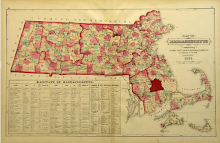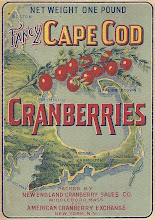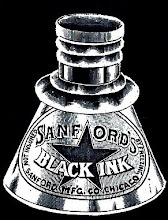 Among the most vilified of men in colonial Massachusetts was Judge Peter Oliver (1713-91) who served as Chief Justice of Massachusetts between 1772 and 1775 and who split his residence between Middleborough and Boston. Oliver's staunch Loyalism increasingly placed him at odds with much of the public following 1765 and public resentment of Oliver was fueled by Mercy Otis Warren (1728-1814) who satirized Oliver and his associates in a series of political plays in the early 1770s.
Among the most vilified of men in colonial Massachusetts was Judge Peter Oliver (1713-91) who served as Chief Justice of Massachusetts between 1772 and 1775 and who split his residence between Middleborough and Boston. Oliver's staunch Loyalism increasingly placed him at odds with much of the public following 1765 and public resentment of Oliver was fueled by Mercy Otis Warren (1728-1814) who satirized Oliver and his associates in a series of political plays in the early 1770s.Between the Oliver and Otis families there existed a long-standing political rivalry partially stemming from the 1761 appointment of Thomas Hutchinson (the father of Oliver's daughter-in-law) as Chief Justice of the Massachusetts Supreme Judicial Court over Warren's father, James Otis, Sr., an act which created a lasting enmity between the two families
No friend to the Olivers, Warren proved how cutting satire could be as she lampooned her victims. Warren's later biographer, Alice Brown, sympathized to a degree with the Loyalists as honest men who simply sought to do their duty to God and King. Yet it should be recalled that Loyalists, too, engaged in similar harshly satiric and biting attacks upon their opponents and Peter Oliver in particular was (and remains) well known for his condescending attitudes towards those with whom he disagreed.
In The Adulator (1773), Warren's principal characters are based upon Oliver, Oliver's brother Lieutenant Governor Andrew Oliver, and Hutchinson (by then Governor of Massachusetts). The names which Warren gives are suggestive. Hutchinson is "Rapatio", Andrew Oliver is "Limput" and Peter Oliver is "Hazelrod", hazel rods being notorious weapons of corporal punishment.
Though in The Adulator, Peter Oliver figures as a lesser character, Warren reserves some of her best words for him. In the following passage, "Limput" (Andrew Oliver) addresses his brother "Hazelrod" (Peter Oliver):
My friend, my brother, or still dearer name,
Thou firm abettor of my grand design!
Thou now canst cover what the world call crimes.
We'll then securely crush the scoundrell mob,
And Claudia-like, the citizens ride o'er
And execute what Nero durst not so -
(Act IV, sc. iii)
In the play, Warren further describes "Hazelrod" as "highly pleasing to the creatures of arbitrary power, and equally disgusting to every man of virtue."
As the Revolutionary fervor grew in Boston through the mid-1770s, life became increasingly unbearable for the most visible Loyalists like Hutchinson who went into exile in 1774. With Hutchinson's removal to England, negative attention increasingly focused upon Peter Oliver as the most prominent of the Massachusetts Loyalists and it is not surprising that he came to figure prominently as the main character in Warren's The Group (1775), again in the personification of "Hazelrod", through which Warren has him speak the following:
Resolv'd more rapidly to gain my point,
I mounted high in justice's sacred seat,
With flowing robes, and head equip'd without,
A heart unfeeling and a stubborn soul,
As qualify'd as e'er a Jefferies was;
Save in the knotty rudiments of law,
The smallest requisite for modern times,
When wisdom, law, and justice are supply'd
By swords, dragoons, and ministerial nods,
Sanctions most sacred in the Pander's creed,
I sold my country for a splendid bribe.
Now let her sink—and all the dire alarms
Of war, confusion, pestilence, and blood,
And tenfold mis'ry be her future doom—
Let civil discord lift her sword on high,
Nay, sheath its hilt e'en in my brother's blood;
It ne'er shall move the purpose of my soul;
Tho' once I trembled at a thought so bold;
By Philalethes's arguments, convinc'd,
We may live Demons, as we die like brutes,
I give my tears, and conscience to the winds.
(Act I, sc. i)
While today some have argued that The Group remains but a "literary curiosity", in its day it, along with Warren's other work, was politically important. The connection between Warren's characters and the people whom they represented was fairly transparent, at least among the Revolutionary community. Proud of his wife's abilities, James Warren shared her work with others including John Adams, and it came to be rapidly disseminated throughout the community which at times deprecatingly referred to the real-life characters by the pseudonyms created for them by Warren. Samuel Adams on one occasion made report that "Rapatio is now gone to Middleboro to consult his Brother Hazelrod".
Illustrations:
"Mercy Otis Warren (Mrs. James Warren)", portrait by John Singleton Copley, Museum of Fine Arts, Boston, oil on canvas, 1763
Sources:
Alice Brown. Mercy Warren. New York: Charles Scribner's Sons, 1896.
Mercy Otis Warren. The Adulateur: A Tragedy as it is now acted in Upper Servia. Boston: 1773. Reprint: Tarrytown, NY: William Abbatt, 1918.
Mercy Otis Warren. The Group, a Farce. Jamaica. Reprinted Philadelphia: James Humphreys, Jr., 1775. Facsimile ed.






















+of+Smoky+Mountains+018.jpg)
0 comments:
Post a Comment